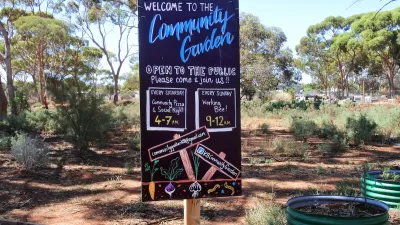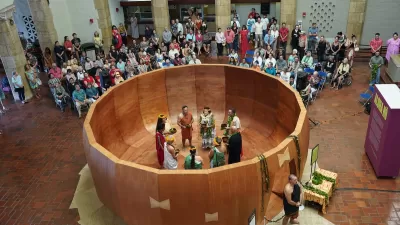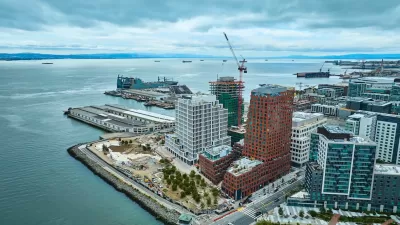South Korea's law mandates developers to commission public art as 1% of the total cost of a proposed project. What the law does not specify is the level of taste that comes with it.
Jung-yoon Choi of The Los Angeles Times reports:
"[C]ritics of the urban improvement effort objected, some saying the law had created a monster that over the years generated too much art that many find objectionable. There's the huge straw man that sits, feet dangling, on the ledge of a downtown building; the copper piece that is supposed to look like a group of people but which many say looks like a dirty ashtray; and a mammoth gorilla wearing a backpack scaling a building."
The solution from policymakers in Seoul?
Under the new law, developers now have the option to abdicate the responsibility of installing public art by donating the money to the government who will do the job for them. The assumption here is that the government "will do a better job of choosing artists and works" than the private sector.
Between 1995 and 2008, more than 10,000 artworks worth $546 million have been installed throughout South Korea.
FULL STORY: Public art rubs Seoul the wrong way

Planetizen Federal Action Tracker
A weekly monitor of how Trump’s orders and actions are impacting planners and planning in America.

Map: Where Senate Republicans Want to Sell Your Public Lands
For public land advocates, the Senate Republicans’ proposal to sell millions of acres of public land in the West is “the biggest fight of their careers.”

Restaurant Patios Were a Pandemic Win — Why Were They so Hard to Keep?
Social distancing requirements and changes in travel patterns prompted cities to pilot new uses for street and sidewalk space. Then it got complicated.

Platform Pilsner: Vancouver Transit Agency Releases... a Beer?
TransLink will receive a portion of every sale of the four-pack.

Toronto Weighs Cheaper Transit, Parking Hikes for Major Events
Special event rates would take effect during large festivals, sports games and concerts to ‘discourage driving, manage congestion and free up space for transit.”

Berlin to Consider Car-Free Zone Larger Than Manhattan
The area bound by the 22-mile Ringbahn would still allow 12 uses of a private automobile per year per person, and several other exemptions.
Urban Design for Planners 1: Software Tools
This six-course series explores essential urban design concepts using open source software and equips planners with the tools they need to participate fully in the urban design process.
Planning for Universal Design
Learn the tools for implementing Universal Design in planning regulations.
Heyer Gruel & Associates PA
JM Goldson LLC
Custer County Colorado
City of Camden Redevelopment Agency
City of Astoria
Transportation Research & Education Center (TREC) at Portland State University
Camden Redevelopment Agency
City of Claremont
Municipality of Princeton (NJ)





























